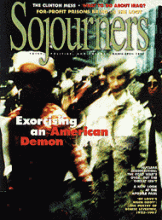When I was 23, Denise Levertov taught me the alphabet. She gently razed everything I thought I knew about poetry and rebuilt it, letter by letter. In a cozy retreat center in the Pocono Mountains, her British-tinged voice burned like a slow oak log. "A is for atom," she said. This woman, whose Hasidic father grew up in the same Russian town as Marc Chagall, whose mother once on a boat from Constantinople to Venice saved the life of the Gypsy King, proceeded in her shy way to uncover the mysteries of Gods universe. "The role of the poet is to witness," she said. "Not only to reveal the divine beauty as Rilke did, but to release the divine beauty."
Denise Levertov was born in 1923 in Ilford, Essex, daughter of Paul Levertoff and Beatrice Spooner-Jones. She never went to school; instead her parents educated their daughters at home with literature, travel, nature study, and the museums of London. She knew "perhaps by age 7," Levertov wrote, "certainly before I was 10that I was an artist-person and had a destiny."
In Levertovs early poetry, she traced in her heritage the thread of her own creative and spiritual impulses (see "Illustrious Ancestors" in The Jacobs Ladder, 1961). "My fathers Hasidic ancestry, his being steeped in Jewish and Christian scholarship and mysticism, his fervor and eloquence as a preacher, were factors built in to my cells....Similarly, my mothers Welsh intensity and lyric feeling for Nature were not just the air I breathed but, surely, were in the body I breathed with."
During World War II, rather than be conscripted into work in a munitions factory, Levertov served as a civilian nurse in London. In her memoirs she writes, "I had scruples of conscience as well as extreme distaste [for munitions work], though I had not yet arrived at a consistent commitment to nonviolence."
Read the Full Article
